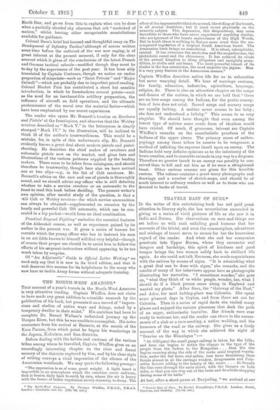THE NORTH-WEST AMAZONS.* This account of a year's travels in
the North-West Amazons is very attractive reading. Captain Whiffen does not claim to have made any great addition to scientific research by the publication of his book, but presents it as a record of "impres- sions and studies of native ways and doings, noted by a temporary dweller in their midst." His ambition had been to complete Dr. Russel Wallace's unfinished journey up the Uaupes River, but this be was unable to accomplish. His notes commence from his arrival at Enoanto, at the mouth of the Kara Parana, from which point he began his wanderings in the Japura, Kuhuinar, and Issa districts.
Before dealing with the habits and customs of the various tribes among whom lie travelled, Captain Whiffen gives us an exceedingly interesting chapter on the river and forest scenery of the districts explored by him, and by his clear style of writing conveys a vivid impression of the silence of the Amazonian woodlands. We may quote the following passage : "The oppression is as of some great weight. A light heart is impossible in an atmosphere which the sunshine never enlivens, that is beaten daily back to earth by rain, where the air is heavy with the fumes of fallen vegetation slowly steaming to decay. The • The North.West Amazon,. By Thomas Whiffen, P,B.G.S., London: Constable and Co. [lb, ed, net.] effect of the impenetrable thickets around, the stiffing of the breath, is all mental doubtless ; but it must re-act physically on the neurotic subject. This depression, this despondency, may seem incredible to those who have never experienced anything similar, who are ignorant of the innate malevolence of the High Woods. But in truth there is nothing in Nature more cruel than the un- conquered vegetation of a tropical South American forest. The Amazonian bush brings no consolation. It is silent, inhospitable, cynical, It has overcome the mastodon and the megatherium, the prehistoric camel and the rhinoceros. It has reduced its rivals of the animal kingdom to slimy alligators and unsightly arm,- dilloes, to sloths and ant-boars. The most powerful tenant of its shades is the boa constrictor, the most majestic tho jaguar. Man is a very puny feature in the Amazonian cosmos."
Captain Whiffen describes native life for us in exhaustive but never wearying detail. We hear of marriage customs, the family, education, industries, agriculture, language, religion, &c. There is also an attractive chapter on the songs and dances of the natives, in which we are told that "there are no love songs among the Indians, for the poetic concep- tion of love does not exist. Sacred songs and nursery songs are equally lacking. A mother never croons to her baby ; she does not understand a lullaby." This seems to us very singular. We should have thought that even among the lowest type of natives some crude form of idealism would have existed. Of much, if gruesome, interest are Captain Whiffen's remarks on the cannibalistic practices of the Indians of the upper rivers. The primary cause of anthro- pophagy among these tribes he asserts to be vengeance, a method of inflicting the supreme insult upon an enemy. The Indiana hold very definite opinions as to the inferiority of the brute creation, and to resemble animals in any way is a disgrace. Therefore no greater insult to an enemy can possibly be con- ceived than to kill and eat him as if he were a slaughtered beast. Other curious reasons are given for this horrible custom. The volume contains a great many photographs and drawings and a number of sketch-maps, and should be of much interest to ordinary readers as well as to those who are devoted to books of travel.














































 Previous page
Previous page